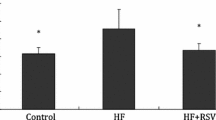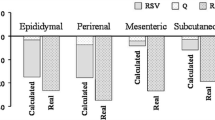Abstract
Resveratrol (RSV) is known to have an antiobesogenic effect because it mimics energy restriction. However, hardly any evidence exists concerning the combined effects of RSV and energy restriction on body fat reduction. So, the aim of the present study was to determine whether RSV increases body fat reduction induced by energy restriction. Male Wistar rats were fed a high-fat, high-sucrose diet for 6 weeks to obtain a diet-induced obesity model. Then they were submitted to a mild energy restriction (25 %) without or with RSV supplementation (30 mg/kg body weight/day) for 2 weeks. Final body weight, subcutaneous and intra-abdominal white adipose tissues weights, Adipose Index, and serum triacylglycerol, cholesterol, glucose, and insulin were assessed. Lipoprotein lipase (LPL), fatty acid synthase (FAS), and acetyl coenzyme A carboxylase (ACC) activities, as well as their genetic expressions, were measured in white adipose tissue. Final body weight, white adipose tissue weights, Adipose Index, and serum triacylglycerol, cholesterol, and insulin were reduced in both groups, but no differences were found among them. FAS, ACC, and LPL activities and expressions were also similar in both groups. These results suggest a lack of any adjuvant effect of RSV on energy restriction for obesity treatment purposes.





Similar content being viewed by others
References
Alberdi G, Rodríguez VM, Macarulla MT, Miranda J, Churruca I, Portillo MP (2013) Hepatic lipid metabolic pathways modified by resveratrol in rats fed an obesogenic diet. Nutrition 29:562–567
Alberdi G, Rodríguez VM, Miranda J, Macarulla MT, Arias N, Andrés-Lacueva C, Portillo MP (2011) Changes in white adipose tissue metabolism induced by resveratrol in rats. Nutr Metab (Lond) 8:29
Alberdi G, Rodríguez VM, Miranda J, Macarulla MT, Churruca I, Arias N, Portillo MP (2010) Reduction of adiposity by resveratrol: mechanisms of action. Obes Rev 11(suppl 1):131
Alberdi G, Rodríguez VM, Miranda J, Macarulla MT, Churruca I, Portillo M (2013) Thermogenesis is involved in body fat-lowering effect of resveratrol in rats. Food Chem 141:1530–1535
Barger JL, Kayo T, Vann JM, Arias EB, Wang J, Hacker TA, Wang Y, Raederstorff D, Morrow JD, Leeuwenburgh C, Allison DB, Saupe KW, Cartee GD, Weindruch R, Prolla TA (2008) A low dose of dietary resveratrol partially mimics caloric restriction and retards aging parameters in mice. PLoS One 3:e2264
Barger JL, Walford RL, Weindruch R (2003) The retardation of aging by caloric restriction: its significance in the transgenic era. Exp Gerontol 38:1343–1351
Borriello A, Cucciolla V, Della Ragione F, Galletti P (2010) Dietary polyphenols: focus on resveratrol, a promising agent in the prevention of cardiovascular diseases and control of glucose homeostasis. Nutr Metab Cardiovasc Dis 20:618–625
Bouwman FG, Claessens M, van Baak MA, Noben JP, Wang P, Saris WH, Mariman EC (2009) The physiologic effects of caloric restriction are reflected in the in vivo adipocyte-enriched proteome of overweight/obese subjects. J Proteome Res 8:5532–5540
Bradamante S, Barenghi L, Villa A (2004) Cardiovascular protective effects of resveratrol. Cardiovasc Drug Rev 22:169–188
Bujanda L, Hijona E, Larzabal M, Beraza M, Aldazabal P, García-Urkia N, Sarasqueta C, Cosme A, Irastorza B, González A, Arenas JI Jr (2008) Resveratrol inhibits nonalcoholic fatty liver disease in rats. BMC Gastroenterol 8:40
Chung JH, Manganiello V, Dyck JR (2012) Resveratrol as a calorie restriction mimetic: therapeutic implications. Trends Cell Biol 22:546–554
Chung KW, Kim DH, Park MH, Choi YJ, Kim ND, Lee J, Yu BP, Chung HY (2013) Recent advances in calorie restriction research on aging. Exp Gerontol 48:1048–1053
Crujeiras AB, Parra D, Goyenechea E, Martínez JA (2008) Sirtuin gene expression in human mononuclear cells is modulated by caloric restriction. Eur J Clin Invest 38:672–678
Cucciolla V, Borriello A, Oliva A, Galletti P, Zappia V, Della Ragione F (2007) Resveratrol: from basic science to the clinic. Cell Cycle 6:2495–2510
Erskine JM, Jensen DR, Eckel RH (1994) Macronutrient regulation of lipoprotein lipase is posttranslational. J Nutr 124:500–507
Folch J, Lees M, Sloane Stanley GH (1957) A simple method for the isolation and purification of total lipids from animal tissues. J Biol Chem 226:497–509
Gómez-Zorita S, Fernández-Quintela A, Macarulla MT, Aguirre L, Hijona E, Bujanda L, Milagro F, Martínez JA, Portillo MP (2012) Resveratrol attenuates steatosis in obese Zucker rats by decreasing fatty acid availability and reducing oxidative stress. Br J Nutr 107:202–210
Gómez-Zorita S, Tréguer K, Mercader J, Carpéné C (2013) Resveratrol directly affects in vitro lipolysis and glucose transport in human fat cells. J Physiol Biochem 69:585–593
Guarente L (2008) Mitochondria—a nexus for aging, calorie restriction, and sirtuins? Cell 132:171–176
Lagouge M, Argmann C, Gerhart-Hines Z, Meziane H, Lerin C, Daussin F, Messadeq N, Milne J, Lambert P, Elliott P, Geny B, Laakso M, Puigserver P, Auwerx J (2006) Resveratrol improves mitochondrial function and protects against metabolic disease by activating SIRT1 and PGC-1alpha. Cell 127:1109–1122
Larson-Meyer DE, Newcomer BR, Heilbronn LK, Volaufova J, Smith SR, Alfonso AJ, Lefevre M, Rood JC, Williamson DA, Ravussin E, Pennington CALERIE Team (2008) Effect of 6-month calorie restriction and exercise on serum and liver lipids and markers of liver function. Obesity (Silver Spring) 16:1355–1362
Lasa A, Schweiger M, Kotzbeck P, Churruca I, Simón E, Zechner R, Portillo MP (2012) Resveratrol regulates lipolysis via adipose triglyceride lipase. J Nutr Biochem 23:379–384
Livak KJ, Schmittgen TD (2001) Analysis of relative gene expression data using real-time quantitative PCR and the 2(-Delta Delta C(T)) Method. Methods 25:402–408
Macarulla MT, Alberdi G, Gómez S, Tueros I, Bald C, Rodríguez VM, Martínez JA, Portillo MP (2009) Effects of different doses of resveratrol on body fat and serum parameters in rats fed a hypercaloric diet. J Physiol Biochem 65:369–376
Marchal J, Blanc S, Epelbaum J, Aujard F, Pifferi F (2012) Effects of chronic calorie restriction or dietary resveratrol supplementation on insulin sensitivity markers in a primate, Microcebus murinus. PLoS One 7:e34289
Miranda J, Fernández-Quintela A, Churruca I, Rodríguez VM, Simón E, Portillo MP (2009) Hepatomegaly induced by trans-10,cis-12 conjugated linoleic acid in adult hamsters fed an atherogenic diet is not associated with steatosis. J Am Coll Nutr 28:43–49
Park SJ, Ahmad F, Philp A, Baar K, Williams T, Luo H, Ke H, Rehmann H, Taussig R, Brown AL, Kim MK, Beaven MA, Burgin AB, Manganiello V, Chung JH (2012) Resveratrol ameliorates aging-related metabolic phenotypes by inhibiting cAMP phosphodiesterases. Cell 148:421–433
Pearson KJ, Baur JA, Lewis KN, Peshkin L, Price NL, Labinskyy N, Swindell WR, Kamara D, Minor RK, Perez E, Jamieson HA, Zhang Y, Dunn SR, Sharma K, Pleshko N, Woollett LA, Csiszar A, Ikeno Y, Le Couteur D, Elliott PJ, Becker KG, Navas P, Ingram DK, Wolf NS, Ungvari Z, Sinclair DA, de Cabo R (2008) Resveratrol delays age-related deterioration and mimics transcriptional aspects of dietary restriction without extending life span. Cell Metab 8:157–168
Sharma N, Arias EB, Sequea DA, Cartee GD (2012) Preventing the calorie restriction-induced increase in insulin-stimulated Akt2 phosphorylation eliminates calorie restriction’s effect on glucose uptake in skeletal muscle. Biochim Biophys Acta 1822:1735–1740
Shillabeer G, Hornford J, Forden JM, Wong NC, Lau DC (1990) Hepatic and adipose tissue lipogenic enzyme mRNA levels are suppressed by high fat diets in the rat. J Lipid Res 31:623–631
Szkudelska K, Nogowski L, Szkudelski T (2009) Resveratrol, a naturally occurring diphenolic compound, affects lipogenesis, lipolysis and the antilipolytic action of insulin in isolated rat adipocytes. J Steroid Biochem Mol Biol 113:17–24
So M, Gaidhu MP, Maghdoori B, Ceddia RB (2011) Analysis of time-dependent adaptations in whole-body energy balance in obesity induced by high-fat diet in rats. Lipids Health Dis 10:99
Strable MS, Ntambi JM (2010) Genetic control of de novo lipogenesis: role in diet-induced obesity. Crit Rev Biochem Mol Biol 45:199–214
Tauriainen E, Luostarinen M, Martonen E, Finckenberg P, Kovalainen M, Huotari A, Herzig K-H, Lecklin A, Mervaala E (2011) Distinct effects of calorie restriction and resveratrol on diet-induced obesity and fatty liver formation. J Nutr Metab 2011:525094
Timmers S, Konings E, Bilet L, Houtkooper RH, van de Weijer T, Goossens GH, Hoeks J, van der Krieken S, Ryu D, Kersten S, Moonen-Kornips E, Hesselink MK, Kunz I, Schrauwen-Hinderling VB, Blaak EE, Auwerx J, Schrauwen P (2011) Calorie restriction-like effects of 30 days of resveratrol supplementation on energy metabolism and metabolic profile in obese humans. Cell Metab 14:612–622
Trepanowski JF, Canale RE, Marshall KE, Kabir MM, Bloomer RJ (2011) Impact of caloric and dietary restriction regimens on markers of health and longevity in humans and animals: a summary of available findings. Nutr J 10:107
Tucci P (2012) Caloric restriction: is mammalian life extension linked to p53? Aging (Albany NY) 4:525–534
Zabala A, Churruca I, Fernández-Quintela A, Rodríguez VM, Macarulla M, Martínez JA, Portillo MP (2006) trans-10,cis-12 Conjugated linoleic acid inhibits lipoprotein lipase but increases the activity of lipogenic enzymes in adipose tissue from hamsters fed an atherogenic diet. Br J Nutr 95:1112–1119
Zabala A, Churruca I, Macarulla MT, Rodríguez VM, Fernández-Quintela A, Martínez JA, Portillo MP (2004) The trans-10,cis-12 isomer of conjugated linoleic acid reduces hepatic triacylglycerol content without affecting lipogenic enzymes in hamsters. Br J Nutr 92:383–389
Acknowledgments
This study was supported by grants from the Ministerio de Ciencia e Innovación (AGL2008-1005-ALI), Instituto de Salud Carlos III (CIBERobn), Government of the Basque Country (IT-572-13), and University of the Basque Country (UPV/EHU) (UFI11/32). G. Alberdi is a recipient of a doctoral fellowship from the Ministerio de Ciencia e Innovación.
Author information
Authors and Affiliations
Corresponding author
Rights and permissions
About this article
Cite this article
Alberdi, G., Macarulla, M.T., Portillo, M.P. et al. Resveratrol does not increase body fat loss induced by energy restriction. J Physiol Biochem 70, 639–646 (2014). https://doi.org/10.1007/s13105-014-0313-8
Received:
Accepted:
Published:
Issue Date:
DOI: https://doi.org/10.1007/s13105-014-0313-8




